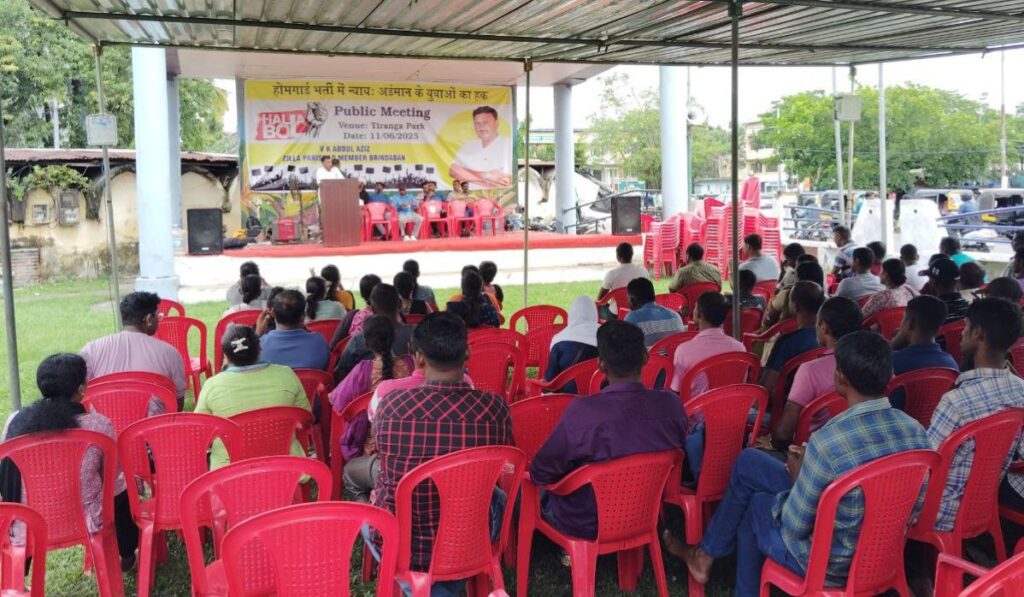Tarun Karthick
Sri Vijaya Puram, 13 June 2025
In a determined show of dissent against growing unemployment and perceived injustice, a group of former Home Guards in the Andaman and Nicobar Islands have entered the third consecutive day of protest, demanding their re-employment in the Andaman and Nicobar Police. The protest, which began with a dharna and public meeting on 11th June, escalated into a relay hunger strike on 12th June, and is expected to transition into a full-fledged hunger strike from today, as per sources close to the protestors.
The agitation is being spearheaded by Mr. V. K. Abdul Aziz, an elected Zilla Parishad Member, who has long supported the former Home Guards’ cause. Mr. Aziz argues that the protesters have rendered dedicated service to the police department over the years, and that many have now crossed the legal age limit for applying to government jobs. According to him, their prolonged service and lack of alternative employment opportunities warrant immediate absorption into the police force as permanent staff.
The roots of the discontent trace back to a significant precedent set more than a decade ago. In 2007, following a judgment by the Hon’ble High Court of Calcutta, Circuit Bench at Port Blair in M.A.T. No. 25 of 2006 (Smti. Parul Debnath & Others vs. Union of India & Others), which was later upheld by the Supreme Court in 2009, the services of 325 Home Guards were regularized with retrospective effect. These appointments were made against supernumerary posts created with the approval of the Government of India, as per Order No. 3390 dated 3rd November 2009.
The court-mandated regularization of those 325 Home Guards had raised hopes among other contractually employed Home Guards that they too would eventually be made permanent. Motivated by this belief, many individuals continued to serve under the expectation of similar absorption. However, for years, no such regularisation has taken place, leaving many in limbo—unemployed, overage for fresh recruitment, and lacking alternative skillsets.
The former Home Guards’ protest also brings to light the broader issue of unemployment in the Union Territory. As per the Periodic Labour Force Survey (PLFS) Annual Report 2023–24 released by the Ministry of Statistics and Programme Implementation, the Andaman and Nicobar Islands recorded one of the highest unemployment rates in the country. The unemployment rate among those aged 15 and above rose from 9.7% in 2022–23 to 11.8% in 2023–24. More alarmingly, graduate unemployment stood at a staggering 33.4%.
In a region where even highly educated individuals are willing to accept low-level contractual government jobs, the issue of sustainable and secure employment has taken center stage. Many believe that securing any position within the government—even temporarily—could potentially lead to permanency through policy shifts or legal interventions.
The latest round of protests was reportedly triggered by the Andaman and Nicobar Police’s recent call for fresh applications for Home Guard posts. This development has been seen by the protesting former Home Guards as a betrayal, with many arguing that priority should be given to those who had already served in the role, often for years, and now find themselves unemployed.
Protesters have warned that unless their demands are addressed, they will continue their agitation and escalate it further. As of 13th June, a complete hunger strike is anticipated, demonstrating the depth of desperation and resolve among the protestors.
As of now, there has been no official response from the Andaman and Nicobar Police or the UT Administration regarding the ongoing protest or the demands raised. The protestors, however, remain steadfast and say they will not back down until they are reinstated or given an assurance of consideration.
The unfolding situation highlights the need for a broader conversation around contractual employment, age-related exclusions, and long-term policy for absorbing experienced personnel in public services within the Islands. With tensions rising and protestors preparing for an indefinite hunger strike, authorities may soon have to confront the issue head-on.

